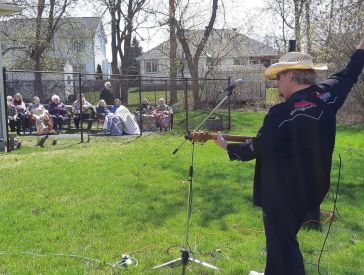CATEGORY: NEWS
The Richmond Care Home, located about 35 minutes outside of Ottawa, serves up to 16 women suffering from a moderate form of dementia. It is the kind of model advocates — horrified with the warehousing

Toronto Sun - June 22, 2020
Before the COVID pandemic — and more so now after the virus wreaked havoc in long-term care homes — my wife and I have often talked about creating a Golden Girls House to support our needs when we get to our golden years.
Like the famous characters of the long-running series, we’d gather a group of women in their 80s to live together with their pets and their treasured knick-knacks supported by caregivers who’d assist with meals, driving and other needs.
My wife and I haven’t exactly decided how many would live in our home, but we do know the home would be located in sunny Florida.
So, it was terribly funny last week to hear officials with Carefor Health and Community Services refer to their Richmond Care Home as a Golden Girls Home.
The Richmond Care Home, located about 35 minutes outside of Ottawa, serves up to 16 women suffering from a moderate form of dementia.
It is the kind of model advocates — horrified with the warehousing of hundreds of compromised seniors in long-term care homes — have been talking about since the neglect in some homes has come to light during the past three months.
Robin Meyers, Carefor’s director of community and personal support services, explains the Richmond Care home is actually a retirement home that provides a very specialized program for women. Their population is 80 years old and up with seven of 14 residents over 90.
She says the focus of the home — which has been open 20 years this September — is to provide supportive dementia care in a home environment.
The idea, says Meyers, is to “live in the whole home” not just in one’s room.
They have a common family room, living room and kitchen where residents can help cook or bake together.
The ladies are also discouraged from remaining in their rooms all day, she adds, noting they participate as much as they can in laundry, meal prep and baking.
“We train and teach our staff to meet the ladies where they’re at, provide them stimulation and social environments,” Meyers says. “We have a secure garden where people can go out on their own … They’re not restricted.”
She says the model of care is “cutting edge” and along the lines of the Butterfly Model of care, which originated in the U.K. and takes a more empathetic, person-centred approach to care for those with dementia.
During the last three months of restrictions due to the COVID pandemic, Meyers says they didn’t have the option of restricting normal activities because they’re a “tight-knit” community.
“We don’t have the luxury of telling people to isolate in their rooms. We’re glad we don’t so this community lived together and safely,” Meyers said.
The home’s program manager, Carole Green, says they had to increase recreational programs and other activities and “become really creative” with their digital meetings to support clients.
When some activities couldn’t be performed, they enhanced services such as yoga and fitness classes and zooming with families.
She says with such a beautiful garden, they purchased a patio set and set up half the chairs outside and half inside to permit visits with the mandated social distancing as soon as the weather started to get nice. Prior to that, they arranged window visits with families.
They’ve also had entertainers performing outside the garden while the ladies sat inside the garden.
“We are able to do those kind of fun things,” Greene says.
Meyers says they know how hard it’s been on the families of their residents but they know the measures they’ve taken have kept residents and staff safe — and the ladies in the home are “feeling quite good” emotionally.
“I have not seen the impact on residents,” she says. “They’re very upbeat … right through this whole process: They gardened, they’ve done crafts, they’ve done yoga together.”
Trish Spindel, a seniors advocate and part of a new group called Seniors for Social Action Ontario, believes institutionalizing seniors is just as “inhumane” as it is for other disadvantaged groups.
Spindel also notes another concept called the Abbeyfield model which is gathering steam in Canada. Its mandate is to provide affordable accommodation and companionship for lonely seniors in small houses, where they live together with a house manager.




